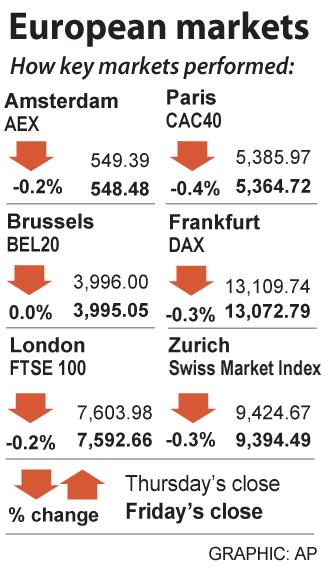The Spanish stock market on Friday tumbled after a victory for Catalan separatists in a snap poll, while London hit an intraday record before retreating.
Madrid’s benchmark IBEX 35 index of top companies ended the session about 1.2 percent lower after the Catalan vote injected new uncertainty into one of Europe’s biggest economies.
With turnout at a record high of 82 percent, Thursday’s election handed a mandate back to the region’s ousted separatist leaders after they campaigned from exile and behind bars.

“Investors in Spain lost their Christmas cheer,” IG Group PLC analyst Jasper Lawler said. “It’s a frustrating result for shareholders invested in Spain to capture the country’s rising economic fortunes. Political disruption looks like it will be an ongoing feature of investing in Spain.”
Frankfurt stocks on Friday declined 0.3 percent and Paris dipped 0.4 percent.
The Catalan result is “likely to keep tensions between Madrid and Barcelona elevated, but, at least for now, not likely seen as leading to an imminent breakup of the eurozone’s fourth-largest economy,” Commonwealth Foreign Exchange analyst Omer Esiner said.
The pan-European STOXX 600 on Friday closed down 0.1 percent at 390.28, an increase of 0.5 percent from a close of 388.19 a week earlier.
London’s FTSE 100 zoomed its way to another intraday record high at 7,614.40 points in low-volume trading, boosted by overnight Wall Street gains and the softer pound.
However, the FTSE on Friday closed at 12:30pm for an early finish at 7,592.66 points, down almost 0.2 percent from Thursday. That was an increase of 1.4 percent from a close of 7,490.57 on Dec. 15.
Trade was choppy, with many investors away for extended Christmas and New Year festivities.
“I think the softer pound has played an important role over the last month or so, as has the tax reform-fueled Santa rally in the US, with a number of FTSE 100 firms having exposure to the economy,” Oanda Corp analyst Craig Erlam told reporters.
The Frankfurt, Madrid and Paris stock markets traded as normal on Friday, but London faced a half-day session.
All four European bourses are to be closed tomorrow and on Tuesday for Christmas and Boxing Day, but reopen on Wednesday.
Additional reporting by staff writer

SEEKING CLARITY: Washington should not adopt measures that create uncertainties for ‘existing semiconductor investments,’ TSMC said referring to its US$165 billion in the US Taiwan Semiconductor Manufacturing Co (TSMC, 台積電) told the US that any future tariffs on Taiwanese semiconductors could reduce demand for chips and derail its pledge to increase its investment in Arizona. “New import restrictions could jeopardize current US leadership in the competitive technology industry and create uncertainties for many committed semiconductor capital projects in the US, including TSMC Arizona’s significant investment plan in Phoenix,” the chipmaker wrote in a letter to the US Department of Commerce. TSMC issued the warning in response to a solicitation for comments by the department on a possible tariff on semiconductor imports by US President Donald Trump’s

The government has launched a three-pronged strategy to attract local and international talent, aiming to position Taiwan as a new global hub following Nvidia Corp’s announcement that it has chosen Taipei as the site of its Taiwan headquarters. Nvidia cofounder and CEO Jensen Huang (黃仁勳) on Monday last week announced during his keynote speech at the Computex trade show in Taipei that the Nvidia Constellation, the company’s planned Taiwan headquarters, would be located in the Beitou-Shilin Technology Park (北投士林科技園區) in Taipei. Huang’s decision to establish a base in Taiwan is “primarily due to Taiwan’s talent pool and its strength in the semiconductor

An earnings report from semiconductor giant and artificial intelligence (AI) bellwether Nvidia Corp takes center stage for Wall Street this week, as stocks hit a speed bump of worries over US federal deficits driving up Treasury yields. US equities pulled back last week after a torrid rally, as investors turned their attention to tax and spending legislation poised to swell the US government’s US$36 trillion in debt. Long-dated US Treasury yields rose amid the fiscal worries, with the 30-year yield topping 5 percent and hitting its highest level since late 2023. Stocks were dealt another blow on Friday when US President Donald

UNCERTAINTY: Investors remain worried that trade negotiations with Washington could go poorly, given Trump’s inconsistency on tariffs in his second term, experts said The consumer confidence index this month fell for a ninth consecutive month to its lowest level in 13 months, as global trade uncertainties and tariff risks cloud Taiwan’s economic outlook, a survey released yesterday by National Central University found. The biggest decline came from the timing for stock investments, which plunged 11.82 points to 26.82, underscoring bleak investor confidence, it said. “Although the TAIEX reclaimed the 21,000-point mark after the US and China agreed to bury the hatchet for 90 days, investors remain worried that the situation would turn sour later,” said Dachrahn Wu (吳大任), director of the university’s Research Center for